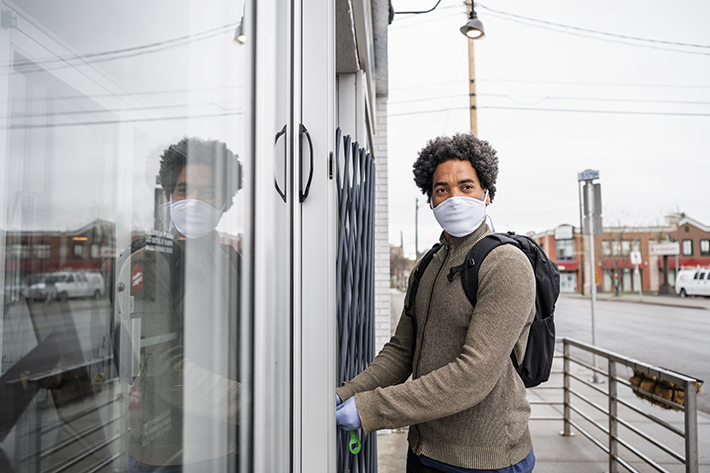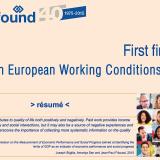EU context
Le temps de travail est un élément clé de la vie professionnelle et sa réglementation se trouve au cœur des discussions politiques, économiques et sociales depuis plusieurs décennies, tant au niveau de l’UE que des États membres. Pour protéger la santé et la sécurité des travailleurs, la directive européenne sur le temps de travail impose à tous les États membres de garantir des normes minimales en matière de temps de travail pour l’ensemble des travailleurs, et ce dans toute l’UE. Il s’agit, entre autres, de normes applicables à la durée maximale hebdomadaire de travail (fixée à 48 heures), aux périodes minimales de repos et aux temps de pause, aux congés annuels, au travail de nuit et au travail posté.
Études d’Eurofound
Depuis de nombreuses années, Eurofound collecte des informations concernant divers aspects du temps de travail ainsi que leurs conséquences sur les conditions de travail et la qualité de vie des hommes et des femmes dans l’UE. Les études menées par Eurofound sur le temps de travail visent à mieux comprendre le mode d’aménagement de ce dernier et ses conséquences sur l’emploi, la productivité, le bien-être et l’équilibre entre vie professionnelle et vie privée. Des données sur le temps de travail fixé par convention collective et sur le rôle des partenaires sociaux sont régulièrement publiées; elles ont dernièrement fait l’objet d’analyses dans une perspective à long terme. Des études comparatives sur le temps de travail des hommes et des femmes indiquent que les hommes sont beaucoup plus susceptibles de travailler un plus grand nombre d’heures et les femmes de consacrer davantage de temps à des tâches ménagères non rémunérées.
Réglementation et aménagement du temps de travail
La réglementation du temps de travail a un rôle à jouer pour améliorer l’équilibre entre vie professionnelle et vie privée, mais également la participation au marché du travail. Dans un environnement économique en rapide évolution, les entreprises et les travailleurs ont besoin de flexibilité. Eurofound a étudié la relation entre le temps de travail et l’équilibre entre vie professionnelle et vie privée sur l’ensemble du déroulement de la vie.
Les études ont porté sur les différents aspects de l’aménagement du temps de travail et les conséquences en termes de productivité et de conditions de travail. Compte tenu de l’évolution de l’aménagement du temps de travail, Eurofound a examiné dernièrement, en collaboration avec l’Organisation internationale du travail (OIT), les effets du télétravail et du travail mobile fondé sur les TIC sur le temps de travail des personnes concernées par de tels régimes.
Dans une approche à long terme du temps de travail, une étude récente a examiné l’évolution de certains aspects du temps de travail fixé par des conventions collectives dans l’UE au début du XXIe siècle. L’étude se concentre plus précisément sur cinq secteurs: les produits chimiques, la métallurgie, le secteur bancaire, le commerce de détail et l’administration publique. Le rapport décrit les systèmes institutionnels de réglementation et évalue l’évolution de la durée conventionnelle et celle de la durée habituelle du travail entre 1999 et 2014.
Le temps de travail dans l’analyse des enquêtes
Trois enquêtes majeures d’Eurofound fournissent des données sur des questions liées au temps de travail.
L’ enquête européenne sur les conditions de travail (EWCS) étudie le temps de travail sous plusieurs angles. Dans la sixième EWCS (2015), la qualité du temps de travail constitue l’un des sept indices de qualité du travail. Cet indice mesure les incidences de longs horaires de travail, la possibilité de faire une pause, les temps de travail atypiques, l’aménagement et la flexibilité des horaires, et détermine dans quelle mesure ces différents aspects ont des répercussions sur la santé et le bien-être des travailleurs. Les résultats indiquent que 43 % des travailleurs suivent des horaires de travail très réguliers.
En s’appuyant sur les données de la sixième EWCS, Eurofound a récemment examiné les modèles de temps de travail pour un travail durable. L’analyse porte sur les liens entre les modèles de temps de travail, l’équilibre entre vie professionnelle et vie privée et les préférences en matière de temps de travail, d’une part, ainsi que la santé et le bien-être des travailleurs, d’autre part. Elle évalue également dans quelle mesure les conditions de travail et les modèles de temps de travail actuels sont viables à long terme.
L’ enquête européenne sur la qualité de vie (EQLS) porte sur les régimes de travail, rémunérés ou non, et sur leur incidence quant à la conciliation entre vie professionnelle et vie privée.
Les régimes de travail peuvent avoir une incidence significative sur l’efficacité, la productivité et la compétitivité des entreprises, sans parler de la santé, du bien-être et de la motivation de leurs employés. Dans le cadre de son enquête sur les entreprises en Europe (ECS), Eurofound a également réalisé une analyse approfondie du temps de travail et de l’équilibre entre vie professionnelle et vie privée. Elle a étudié la prévalence des régimes de travail flexibles et des comptes épargne-temps, du travail à temps partiel, des heures supplémentaires et horaires de travail atypiques, des congés parentaux et autres congés de longue durée, des retraites progressives et anticipées ainsi que des mesures spécifiques d’amélioration de l’équilibre entre vie professionnelle et vie privée adoptées par les entreprises.
Gros plan sur: rapport thématique d’EurWORK sur le travail dominical en Europe
23 septembre 2016 – Les États membres de l’UE ont adopté des lois visant à réglementer les heures d’ouverture des magasins et des entreprises le dimanche. Certains ont toutefois mis en place de nouvelles législations limitant les heures d’ouverture. D’après l’enquête européenne sur les conditions de travail, la proportion de travailleurs indiquant travailler le dimanche a augmenté entre 2010 et 2015, ce qui confirme l’idée selon laquelle il devient de plus en plus courant de travailler le dimanche.
What’s happening with Sunday work in Europe
Ressources



































